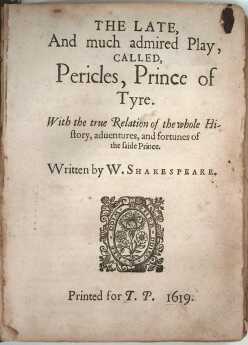Dr. Michael Delahoyde
Washington State University
PERICLES
ACT III
Gower tells us that Pericles and Thaisa have been married and now she's
knocked up. A dumb show reveals Pericles receiving a letter, then he,
Thaisa, and their nurse taking leave of Simonides. Gower explains that
Antiochus and his daughter are reported dead and Helicanus has refused
the crown of Tyre. Pericles, the pregnant Thaisa, and Lychorida the nurse
set sail but encounter a sea storm.
SCENE i
Pericles onboard prays for the tempest at sea to wane. The violent storm
has sent Thaisa into labor, and the nurse emerges with an infant, saying
Thaisa has died giving birth: "Here's all that is left living of your
queen: / A little daughter" (III.i.20-21). Pericles has found a
Shakespearean eloquence in this scene and expounds on the circumstances.
The sailors' superstitiousness demands that Thaisa's corpse be chucked
overboard, so Pericles orders a coffin to be made. The sailors have a
chest, "caulk'd and bitum'd ready" (III.i.71). So "He is obliged to cast
her overboard" (Ogburn and Ogburn 129). Pericles decides to head
for Tharsus where Cleon can serve as a foster parent for the infant who,
says Pericles, "Cannot hold out to Tyrus" (III.i.79).
|
SCENE ii
Thaisa has been given the heave-ho near Ephesus, where the admirable Lord
Cerimon studies medicine:
'Tis known, I ever
Have studied physic; through which secret art,
By turning o'er authorities, I have,
Together with my practice, made familiar
To me and to my aid the blest infusions
That dwells in vegetives, in metals, stones;
And can speak of the disturbances
That nature works, and of her cures; which doth give me
A more content in course of true delight
Than to be thirsty after tottering honor,
Or tie my pleasure up in silken bags,
To please the fool and death.
(III.ii.31-42)
His name probably comes from the Latin cærimonia = the sacred,
the divine (Clark 72), and he has been seen as a representation of Elizabeth's
trusted astronomer Dr. Dee, with whom Oxford probably studied (Clark 71;
Ogburn and Ogburn 129; cf. Sonnet 14).
But a gentleman asserts that he has won honors throughout the realm
through all he's cured.
|

|
Servants bring in a chest that the sea tossed ashore. When they wrench it
open it yields "A delicate odor" (III.ii.61), and of course this turns
out to be Thaisa's coffin, containing her body, bags of spices, and a
note requesting her to be buried in a manner befitting a queen and
daughter of a king. Cerimon thinks she's not dead yet: "Death may usurp
on nature many hours, / And yet the fire of life kindle again / The
o'erpress'd spirits" (III.ii.82-84). With the help of some music, indeed
Thaisa wakes up, disoriented: "O dear Diana, / Where am I? Where's my
lord? What world is this?" (III.ii.104-105). "Is this not strange?" asks
a gentleman. "Most rare," says another (III.ii.106). "Saint Paul wrote
of the Ephesians that they 'used curious arts' (Acts of the Apostles
19:19), or magic, so Shakespeare's audience would not have been surprised
to find at Ephesus just such a natural magician, the doctor Cerimon"
(Garber 768).
So, "Pericles marries Thaisa, they have a daughter, and then he is quickly
separated from both. In real life, de Vere married Anne Cecil, she bore
him a daughter (Elizabeth Vere), and then they were separated -- but at his
own instigation" (Farina 100).
SCENE iii
Pericles has spent about a year with Cleon and his wife Dionyza in
Tharsus, and now must travel home to Tyre. He has named his daughter
Marina because she was born at sea, and he entrusts her to Cleon and
Dionyza, "beseeching you / To give her princely training, that she may
be / Manner'd as she is born" (III.iii.15-17). Pericles vows never to
cut his hair (?) until Marina is married. "In the center of the play we
suddenly find Pericles and Thaisa each inhabiting a wasteland: bereft of
wife or husband, bereft of child. Each performs an act of self-abnegation"
(Garber 770).
SCENE iv
Mention is made of some letters and jewels that were in Thaisa's coffin.
She has only partial memory, figures her husband is dead, and decides to
become a vestal virgin at the temple of Diana, the goddess of chastity
and of the hunt, in Ephesus. Of course, Diana of the Ephesians is a
fecundity goddess, not the moon-virgin (Asimov 195).
Act IV
Shakespeare Index
